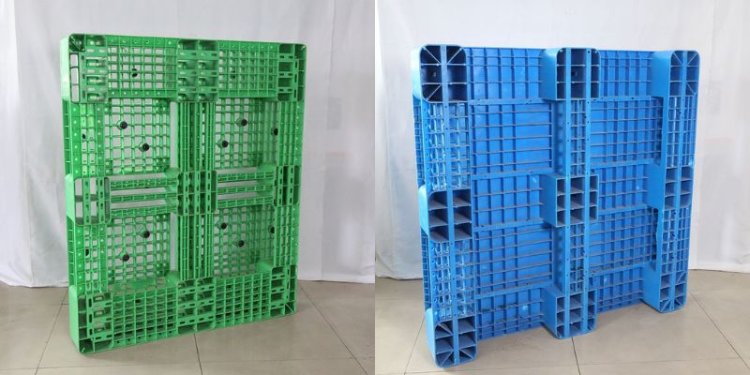Understanding Quality Standards in Plastic Pallet Manufacturing
Explore quality standards in plastic pallet manufacturing, covering materials, durability, safety, sustainability, and compliance for industry excellence.
Introduction
Plastic pallet manufacturing has evolved significantly to meet the increasing demands of various industries. Ensuring quality standards in production is essential for durability, safety, and sustainability. This article explores the key factors that influence the quality of plastic pallet manufacturers in Chennai and the standards that govern the industry.
Material Selection for Durability
Quality plastic pallets begin with the selection of high-grade raw materials. Manufacturers use virgin and recycled plastic materials such as polyethylene and polypropylene to achieve strength and longevity. The choice of material influences resistance to impact, moisture, and temperature fluctuations, making it crucial for meeting industry requirements.
Manufacturing Techniques and Consistency
Advanced production methods like injection molding, rotational molding, and thermoforming ensure uniformity and structural integrity. These techniques allow manufacturers to create pallets with consistent weight distribution, load-bearing capacity, and durability. Quality control measures in each stage of manufacturing help prevent defects and ensure reliability.
Load Capacity and Structural Integrity
Plastic pallets must meet specific load-bearing standards to handle different weights without deformation. Testing is conducted to assess static, dynamic, and racking loads, ensuring pallets can withstand heavy-duty industrial use. Proper design considerations, such as reinforced edges and interlocking structures, enhance performance under varying loads.
Compliance with Safety Regulations
Safety is a major aspect of plastic pallet manufacturing. Industry regulations mandate adherence to fire resistance, non-toxicity, and hygiene standards, especially for food and pharmaceutical applications. Compliance with safety guidelines ensures that pallets do not compromise product integrity or worker safety.
Environmental Sustainability and Recycling Initiatives
Sustainable practices in plastic pallet manufacturing are gaining importance. Many manufacturers incorporate recycled materials and design pallets for reusability. End-of-life recycling programs reduce plastic waste and contribute to a circular economy. Eco-friendly production processes and biodegradable options further support sustainability efforts.
Hygienic Standards for Specific Industries
Industries such as food, pharmaceuticals, and healthcare require pallets that meet strict hygiene standards. Smooth, non-porous surfaces prevent bacterial growth, while chemical resistance ensures contamination-free transport. Regular washing and sanitation compliance are essential for maintaining industry-specific cleanliness requirements.
Weather and Chemical Resistance
Plastic pallets are exposed to various environmental factors, including extreme temperatures, humidity, and chemical exposure. High-quality pallets are designed to withstand these conditions without warping or degrading. UV stabilizers, anti-corrosive coatings, and impact-resistant additives enhance longevity in demanding environments.
Testing and Quality Assurance Procedures
Comprehensive testing protocols are followed to evaluate the strength, durability, and safety of plastic pallets. Impact resistance tests, drop tests, and load simulations ensure the products meet industry standards. Regular quality checks help identify defects and maintain consistency in mass production.
Customization for Industry-Specific Needs
Different industries require pallets with specific designs, dimensions, and weight capacities. Customization options include reinforced corners, non-slip surfaces, and RFID tracking integration. These features enhance functionality and efficiency for warehousing, logistics, and automated handling systems.
Fire Retardancy and Heat Resistance
Fire safety is a key consideration in plastic pallet manufacturing. Fire-retardant additives are used to minimize the risk of ignition and spread. Compliance with fire resistance standards is particularly important for storage facilities and industries handling flammable goods.
Standardization and International Quality Certifications
Quality certifications and compliance with international standards ensure consistency in manufacturing. Certifications related to ISO, FDA, and HACCP validate that plastic pallets meet regulatory requirements. These standards help manufacturers deliver high-performance pallets that cater to global industry expectations.
Automation and Smart Pallet Technologies
Technological advancements are shaping the future of EPE foam sheet manufacturers in Chennai. The integration of smart features such as RFID tracking, IoT connectivity, and barcode scanning enhances logistics efficiency. Automated production lines ensure precision and consistency in large-scale manufacturing.
Cost Efficiency and Long-Term Benefits
Investing in high-quality plastic pallets provides long-term savings through durability and reusability. Unlike wooden alternatives, plastic pallets offer extended lifespan, reduced maintenance costs, and resistance to pests and contamination. Cost-effective production methods contribute to affordability without compromising quality.
Future Trends in Plastic Pallet Manufacturing
The industry continues to innovate with sustainable materials, advanced manufacturing techniques, and automation. Future trends focus on lightweight designs with increased strength, AI-powered quality control, and eco-friendly alternatives. These developments aim to enhance performance while reducing environmental impact.
Conclusion
Maintaining high-quality standards in plastic pallet manufacturing is essential for efficiency, durability, and sustainability. By adhering to material selection, safety regulations, and industry-specific requirements, manufacturers ensure that their products meet global standards. As technology and sustainability drive future innovations, the industry is set to evolve with improved performance and eco-conscious solutions.
What's Your Reaction?





















.jpg)